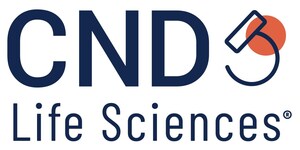Grant Supports the Evaluation of the Syn-One Test® to Help Clinicians Determine More Precise Diagnoses of Dementias at Early Stages of Cognitive Impairment
PHOENIX, May 18, 2022 /PRNewswire/ -- CND Life Sciences, an innovative medical diagnostics company pioneering the detection, visualization, and quantification of protein deposition in cutaneous nerve fibers, has been awarded a $2.4 million Phase II Small Business Innovation Research (SBIR) grant from the National Institute on Aging (NIA) of the National Institutes of Health (NIH). This is the second NIH SBIR Phase II award for the company to study and advance the application of the Syn-One Test, the only commercially available test that uses skin biopsies to help clinicians distinguish between serious neurologic disorders, such as dementia with Lewy bodies (DLB) and Alzheimer's disease.
"Millions of older adults experience mild cognitive impairment (MCI) and are at greater risk of developing a more serious form of dementia 5-10 years after the appearance of MCI symptoms," said Todd Levine, MD, CND's chief medical officer and principal investigator for the grant. "Understanding the type of dementia that is developing early in the disease course is becoming increasingly important, as novel drug therapies and other treatment interventions are finally becoming a reality."
CND's Syn-One Test uses small skin biopsies collected from a patient in a physician's office to accurately identify the presence of misfolded, phosphorylated alpha-synuclein, the abnormal form of the protein that is the pathological hallmark of multiple neurological disorders including DLB. Patients with MCI and clinicians who treat them often are unable to predict the progression of disease and distinguish the type of dementia that may evolve. This lack of diagnostic certainty can lead to unnecessary tests, frustration by patients and caregivers, and suboptimal care.
"The study of CND's Syn-One Test for patients in the early stages of cognitive impairment is an important and timely investigation for the dementias field," said Angela Taylor, the Interim Executive Director of the Lewy Body Dementia Association (LBDA). "Too often people with Lewy body dementia are misdiagnosed or diagnosed very late in the disease course and do not receive proper treatment tailored specifically to their diagnosis or have the information needed to make important care planning decisions. Having a more definitive diagnosis earlier in the journey of people with progressive cognitive impairment will be a major advantage in the future to treat dementias effectively," said Ms. Taylor.
CND's NIH SBIR award will allow the company to conduct an 80-patient, multicenter clinical study with leading neurologists and academic centers across the U.S. Leveraging CND's unique cutaneous neurodiagnostic platform, the study aims to distinguish DLB from Alzheimer's disease at the early stage of MCI. By receiving pathological confirmation of disease at a very early stage through the Syn-One Test, clinicians would be able to optimize patient care with appropriate treatments for the correct disease.
About CND Life Sciences and the Syn-One Test
Founded in 2017, CND Life Sciences is dedicated to supporting the care of patients facing the potential diagnosis of a neurodegenerative disease and other neurological conditions. Operating a CLIA-certified laboratory in Phoenix, Arizona, CND launched the Syn-One Test as the world's first commercially available test to detect, visualize, and quantify phosphorylated alpha-synuclein located in cutaneous nerve fibers in 2019. The test, which analyzes small skin biopsies collected conveniently from the patient in a physician's office, aids in the diagnosis of a synucleinopathy including Parkinson's disease, dementia with Lewy bodies, multiple system atrophy, pure autonomic failure, and REM sleep behavior disorder. The Syn-One Test leverages a decade of published science from leading academic institutions in multiple countries and has demonstrated over 95% sensitivity and specificity. The company has research collaborations with multiple biopharmaceutical companies and in 2020 was awarded a previous NIH SBIR award to advance the validation and clinical utility of its Syn-One Test. For more information visit www.cndlifesciences.com.
About Synucleinopathies
There are over 20 million people in the US who suffer from movement disorders, cognitive impairment, autonomic dysfunction, and sleep disorders combined. A percentage of these patients exhibit signs and symptoms that may be indicative of a synucleinopathy, a group of serious neurodegenerative diseases including Parkinson's and dementia with Lewy bodies, that universally feature a misfolded, abnormal form of the alpha-synuclein protein. For a portion of these patients, the absence of objective pathological proof makes a physician's diagnosis and treatment choices difficult to determine with confidence. Published studies suggest that even the most experienced neurologists specializing in movement and cognitive disorders may misdiagnose these conditions at least 30% of the time early in the disease course when compared to gold standard autopsy studies.
Disclosure: Research reported in this publication was supported by the National Institute of Neurological Disorders and Stroke and the National Institute on Aging (NIA) of the National Institutes of Health under Award Numbers R44NS117214 and R44AG076072. The content is solely the responsibility of the authors and does not necessarily represent the official views of the National Institutes of Health.
Contact: Kendall Swanson
Marketing Communications
P: 480.386.6667
[email protected]
SOURCE CND Life Sciences

WANT YOUR COMPANY'S NEWS FEATURED ON PRNEWSWIRE.COM?
Newsrooms &
Influencers
Digital Media
Outlets
Journalists
Opted In





Share this article